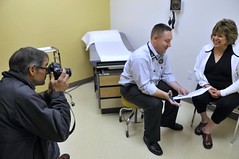There are those of us who have worked toward justice in our healthcare system for years; even when I was a physician-owner of a for-profit medical practice, I was resistant to actions which were inherently unjust toward those in need. So, for many of us, the healthcare reform debate has been a long time coming.
And, I'm still caught off guard that this issue has indeed become so commonplace. I was at a coffee shop the other morning for breakfast with my family. It's a vegan-friendly, dare I say "hippie" place in Tacoma. And, as I turned to put some cream and sugar in my coffee, I saw a flyer for
MadAsHellDoctors.com. It's refreshing and encouraging that it's become 'top of mind' for so many people.
But, I'm discouraged that the conversation, the debate, has become so filled with anger, mistrust, and misinformation. So, after hearing some of these concerns from those in our local
Town Hall Meetings, let me see if I can adress some of these issues. And, I'll use Bob LeBow's "
Health Care Meltdown" as a point of reference...nearly five years after Dr. LeBow's book was first published, it has been revised and re-released.
One of the things that keeps getting in the way of constructive conversation is the claim that healthcare reform will lead to ...
rationing. Well, let's talk about that.
In chapter 4 of
Health Care Meltdown: Confronting the Myths and Fixing our Failing System, Dr. LeBow adresses the issue of rationing. I've heard many say that America has the
best health care in the world. And, I'm afraid that patriotism is being confused with the opportunity and obligation to examine ourselves. We can be patriotic, and still be able to point out areas which need improvement in our country. And, clearly, the area of rationing of health care is one of those areas.
Just this week, another one of those self-evident articles reached publication. (I talked about that on
my post "Stating the obvious.")
This article has the subtitle "Going without (insurance) coverage greatly increases mortality." Really? I guess we have to state that explicitly for those who say that all Americans (and even "illegals") have ready access to health care, through any
Emergency Department. But, the article does go on to help quantify the problem of delaying access to care. And makes the claim that as many
"as 44,789 working Americans die each year because they lack health insurance." The study was published this week in the
American Journal of Public Health, and notes that more people die each year from lack of insurance coverage (and lack or delay of care) than from kidney disease. (Of course, if you have kidney failure, our government will give you insurance to pay for your care, including dialysis, regardless of your income status - why aren't we upset at that "socialist" act? You have a legally-mandated right to public insurance coverage for this single health condition.)
So, this "news" reinforces what Dr. LeBow wrote - rationing takes place in America, and it leads to delay in care. And, delay in care leads to higher cost care, with lesser outcomes - people without insurance wait to go see the doctor until they "have" to, and then often have lost the benefit of early treatment, when the cost is lower and the chance for cure is much higher. As a physician working with the underserved, I see this every day...
So, let's not kid ourselves. Yes, America is a great place. And, it is not unpatriotic to acknowledge that our citizens are at risk because of the rationing that we currently have;
we can do better.





